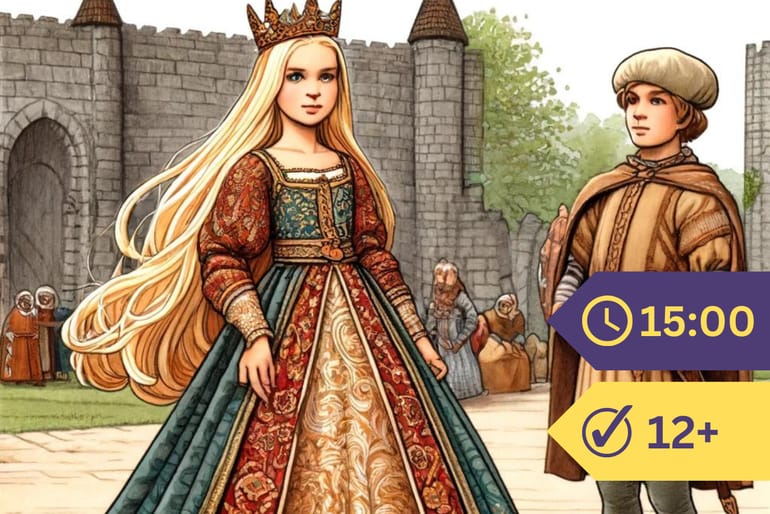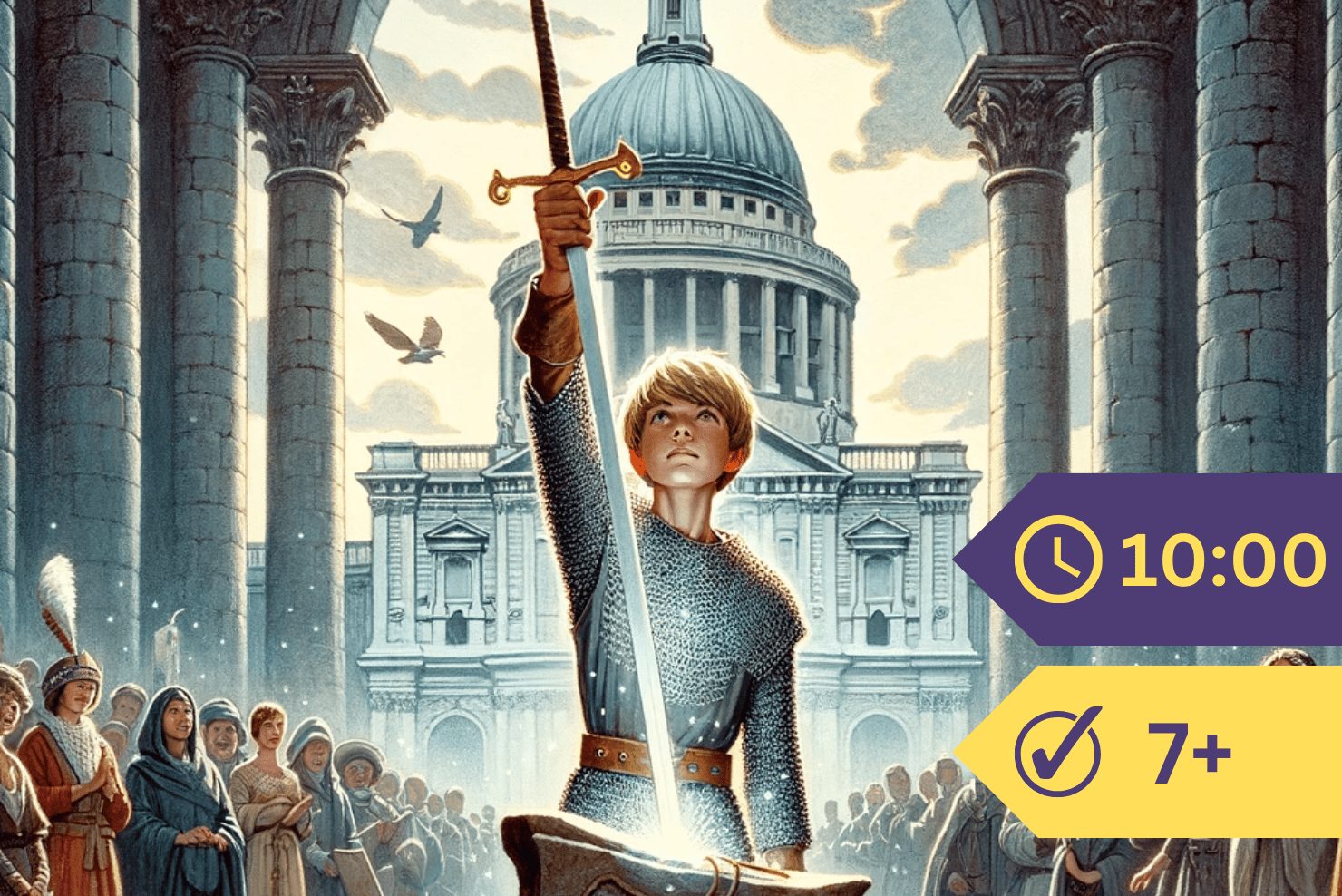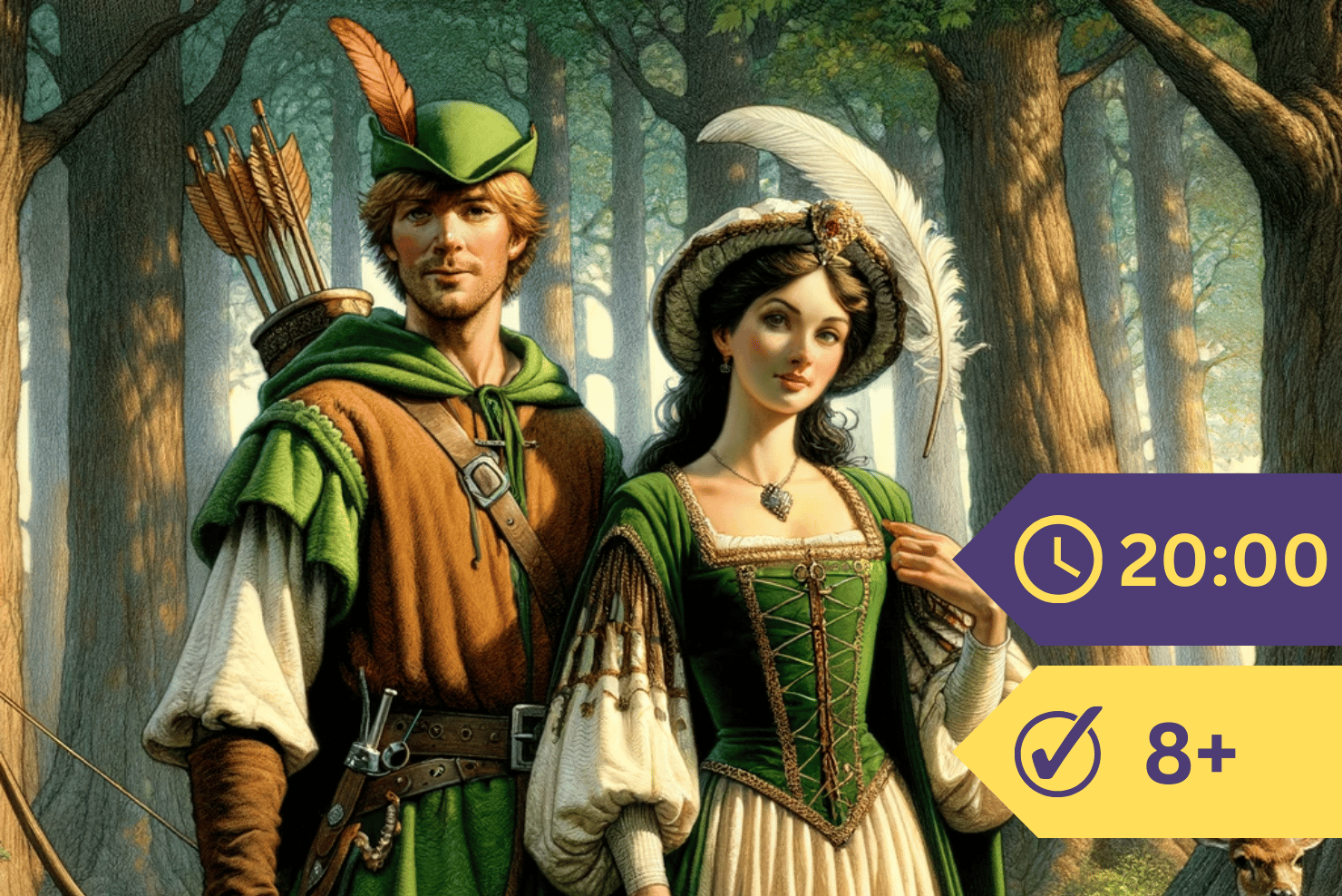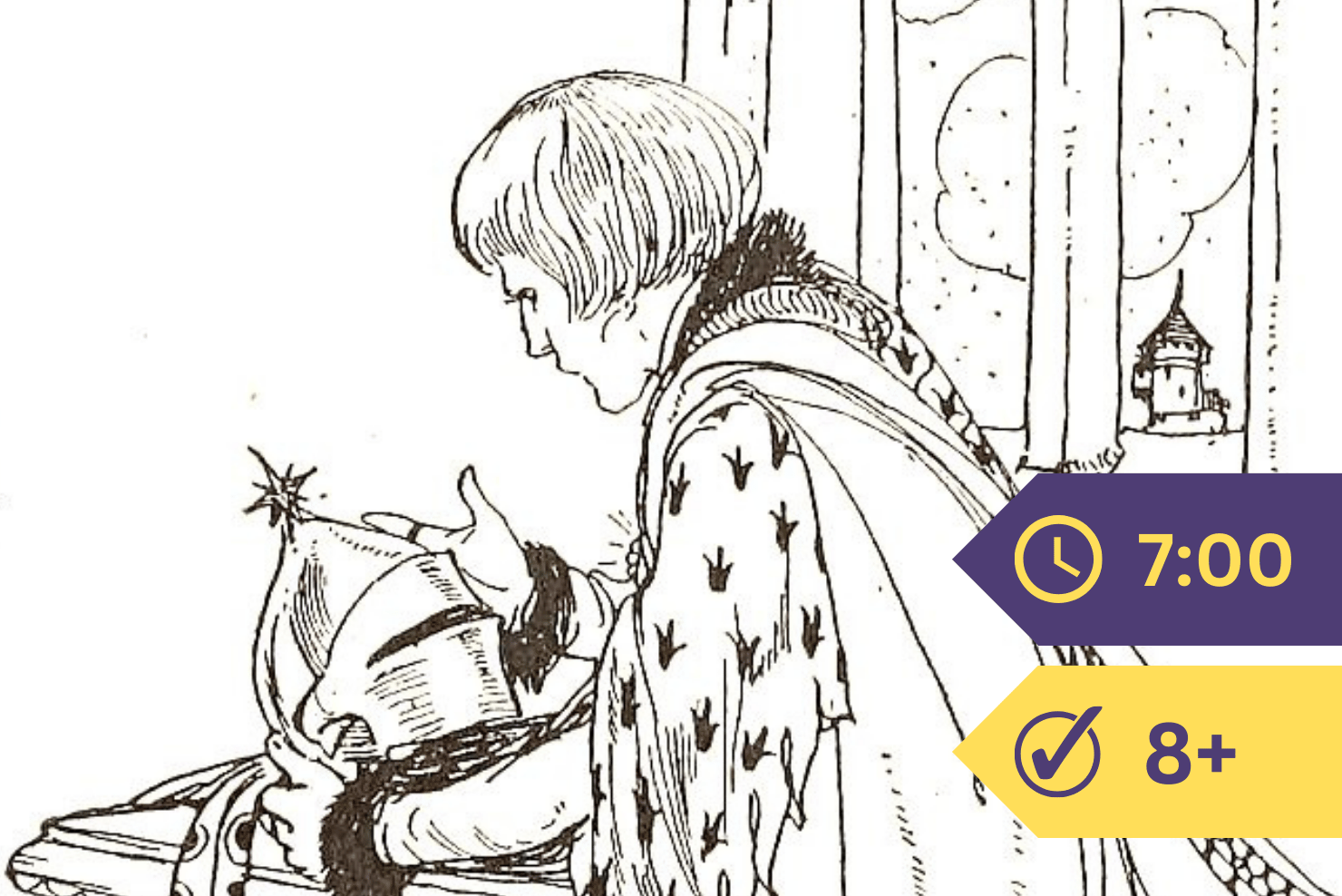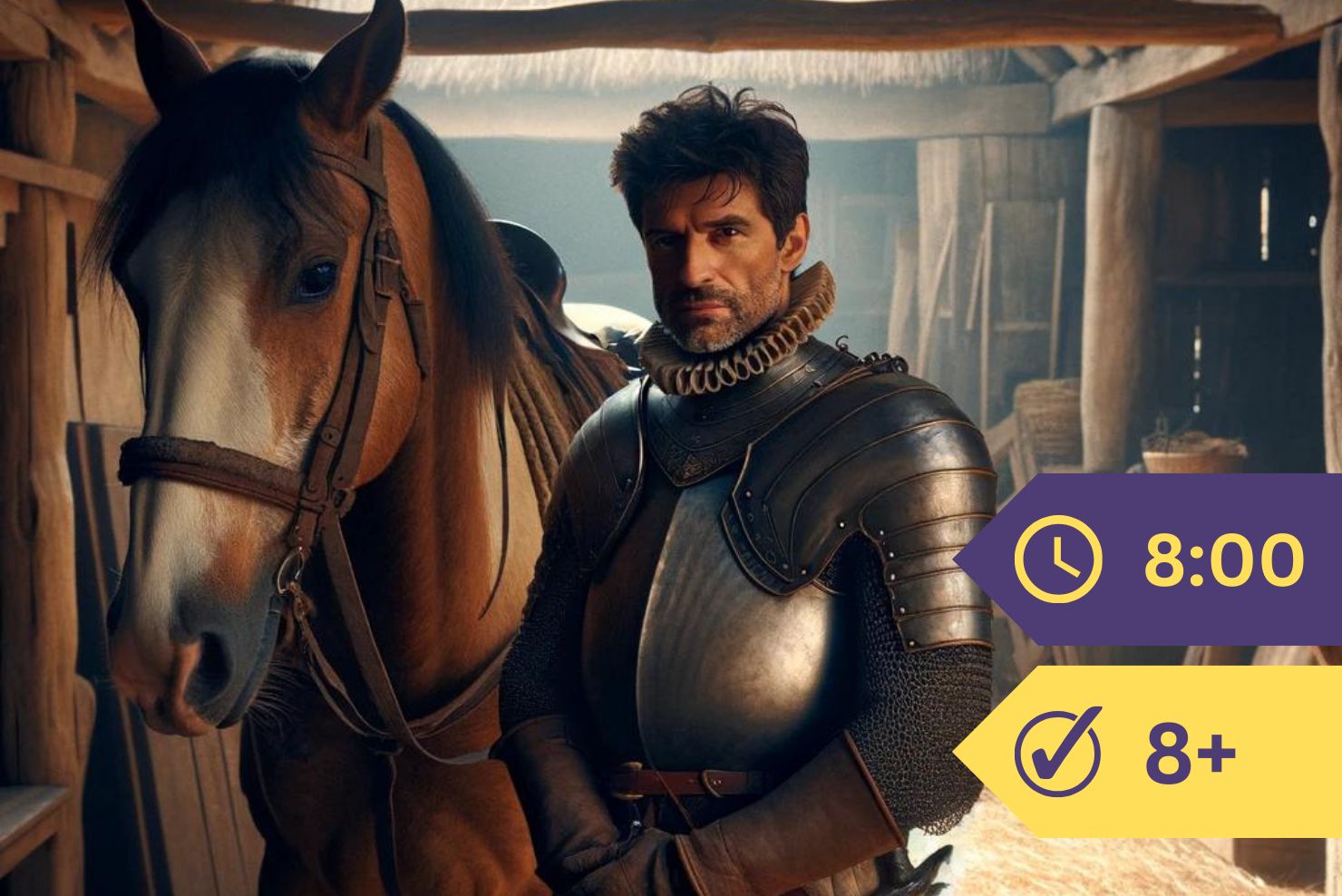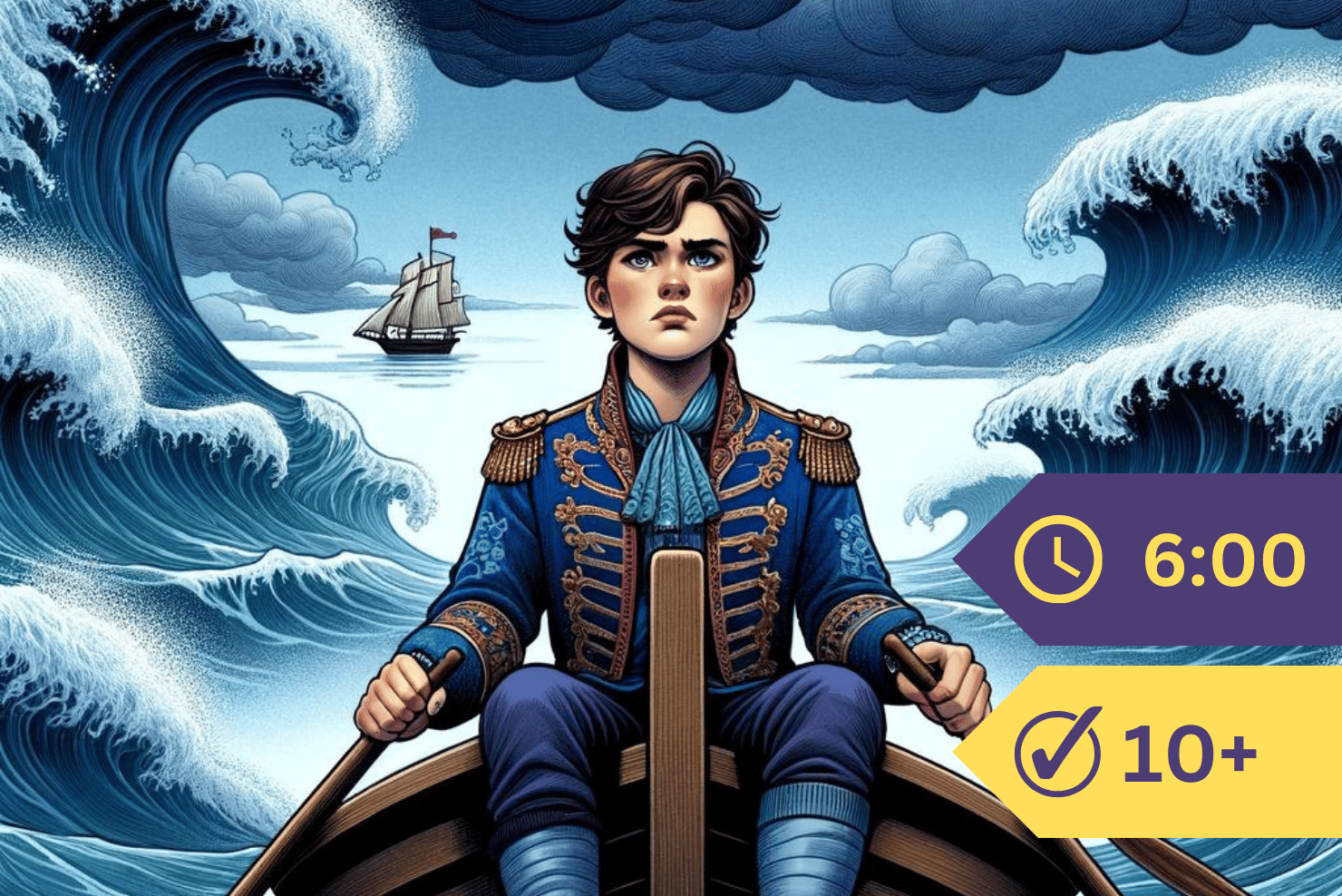King Falangiez reigned in Great Britain, and died without children. He left a brother Lisuarte, of great goodness in arms, and much discretion, who had married Brisena, daughter of the King of Denmark; and she was the fairest lady that was to be found in all the islands of the sea. After the death of the king the chief men of his land sent for Lisuarte to be their king.
When King Lisuarte heard this embassage he set sail with a great fleet, and on their way they put into Scotland, where he was honorably received by King Languines. Brisena, his wife, was with him, and their daughter Oriana, born in Denmark and then about ten years old, the fairest creature that ever was seen, wherefore she was called the one without a peer. And because she suffered much at sea it was determined to leave her there. Right gladly did King Languines accept this charge, and his queen said: “Believe me, I will take care of her like her own mother.” So Lisuarte proceeded.
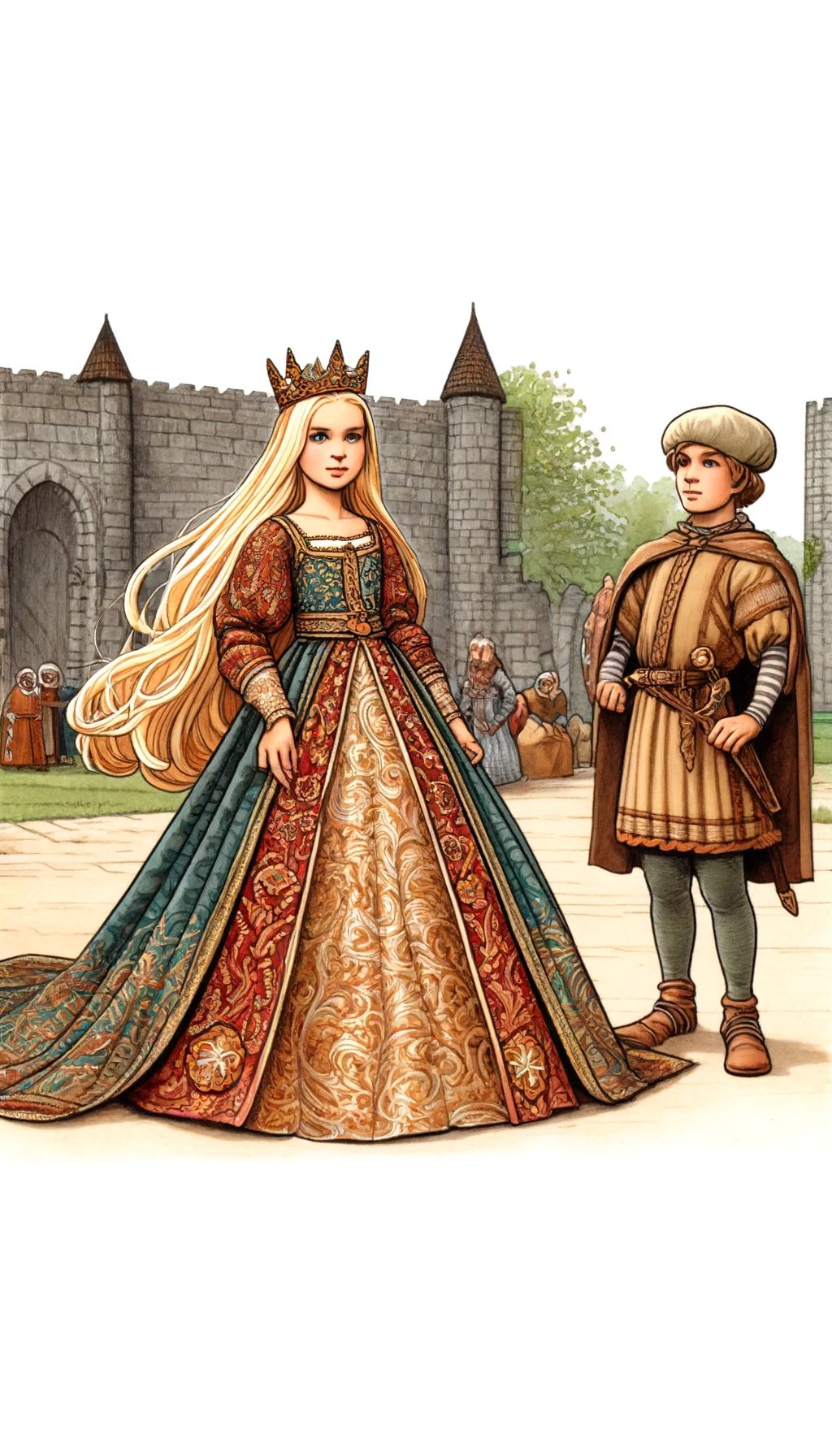
The Child of the Sea was now twelve years old, but in stature and size he seemed fifteen, and he served the queen; but now that Oriana was there the queen gave her the Child of the Sea that he should serve her, and Oriana said that it pleased her; and that word which she said the child kept in his heart, so that he never lost it from his memory, and in all his life he was never weary of serving her, and his heart was surrendered to her, and his love lasted as long as they lasted, for as well as he loved her did she also love him. But the Child of the Sea, who knew nothing of her love, thought himself presumptuous to have placed his thoughts on her, and dared not speak to her; and she who loved him in her heart was careful riot to speak more with him than with another; but their eyes delighted to reveal to the heart what was the thing on earth that they loved best. And now the time came that he thought he could take arms if he were knighted, and this he greatly desired, thinking that he could do such things that, if he lived, his mistress would esteem him. With this desire he went to the king, who was at that time in the garden, and fell upon his knees before him, and said, “Sire, if it please you, it is time for me to receive knighthood.” “How, Child of the Sea?” said Languines, “are you strong enough to maintain knighthood? it is easy to receive, but difficult to maintain; and he who would keep it well, so many and so difficult are the things he must achieve, that his heart will often be troubled; and if, through fear, he forsakes what he ought to do, better is death to him than life with shame.” “Not for this,” replied he, “will I fail to be a knight; my heart would not require it, if it were not in my will to accomplish what you say. And since you have bred me up, complete what you ought to do in this; if not, I will seek some other who will do it.” The king, who feared lest he should do this, replied, “Child of the Sea, I know when this is fitting better than you can know, and I promise you to do it, and your arms shall be got ready; but to whom did you think to go?” “To King Perion, who they say is a good knight, and has married the sister of your queen. I would tell him how I was brought up by her, and then he would willingly fulfil my desire.” “Now,” said the king, “be satisfied, it shall be honourably done.” And he gave orders that the arms should be made, and sent to acquaint Gandales thereof.
When Gandales heard this, he greatly rejoiced; and sent a damsel with the sword and the ring and the letter in the wax, which he had found in the ark. The Child of the Sea was with Oriana and the ladies of the palace, discoursing, when a page entered and told him there was a strange damsel without who brought presents for him, and would speak with him. When she who loved him heard this her heart trembled, and if any one had been looking at her he might have seen how she changed; and she told the Child of the Sea to let the damsel come in, that they might see the presents. Accordingly she entered, and said, “Sir Child of the Sea, your good friend Gandales salutes you as the man who loves you much, and sends you this sword and this ring and this wax, and he begs you will wear this sword while you live for his sake.” He took the presents, and laid the ring and the wax in his lap, while he unrolled the sword from a linen cloth in which it was wrapt, wondering that it should be without a scabbard. Meantime Oriana took up the wax, and said, “I will have this,” not thinking that it contained anything: it would have better pleased him if she had taken the ring, which was one of the finest in the world. While he was looking at the sword, the king came in and asked him what he thought of it. “It seems a goodly one, sir,” said he, “but I marvel wherefore it hath no scabbard.” “It is fifteen years,” said the king, “since it had one”; and, taking him by the hand, he led him apart, and said, “You would be a knight, and you know not whether of right you should be one. I therefore tell you all that I know concerning you.” And with that he told him all that Gandales had communicated. The Child of the Sea answered, “I believe this; for the damsel said my good friend Gandales had sent her, and I thought she had mistaken, and should have called him my father; but am nothing displeased herewith, except that I know not my parents, nor they me, for my breast tells me I am well born; and now, sir, it behoves me more to obtain knighthood, that I may win honour and the praise of prowess, since I know not my lineage, and am like one whose kindred are all dead.” When the king heard him speak thus, he believed that he would prove a hardy and good knight.
As they were thus conversing, a knight came to inform the king that King Perion was arrived. Languines went to welcome him, as one who knew how to do honour to all, and, after they had saluted, he asked how it was that he came so unexpectedly. “I come to seek for friends,” replied Perion, “of whom I have more need than ever; for King Abies of Ireland wars upon me, and is now, with all his power, in my country; and Daganel, his half-brother, is with him; and both together have collected such a multitude against me that I stand in need of all my friends and kinsmen; for I have lost many of my people in battle already, and others whom I trusted have failed me.” “Brother,” replied Languines, “your misfortunes grieve me not a little, and I shall aid you the best I can.” Agrayes, who was already knighted, now came and knelt before his father, saying, “Sir, I beg a boon.” The which being granted,—for King Languines loved him as himself,—he pursued, “I request that I may go to defend the queen, my aunt.” “And I grant it,” answered Languines; “and you shall be as honourably and well accompanied as may be.”
This while had the Child of the Sea been looking earnestly at Perion, not as his father, for of that he knew nothing, but because of his great goodness in arms, of which he had heard the fame; and he desired to be made a knight by his hand, rather than by any man in the world. To attain this purpose, he thought best to entreat the queen; but her he found so sad that he would not speak to her, and going to where Oriana was, he knelt before her, and said, “Lady Oriana, could I know by you the cause of the queen’s sadness?” Oriana’s heart leaped at seeing him whom she most loved before her, and said to him, “Child of the Sea, this is the first thing ye ever asked of me, and I shall do it with a good will.”—”Ah, lady! I am neither so bold nor worthy as to ask anything from one like you, but rather to obey what it pleases you to command.” “What!” said she. “Is your heart so feeble?”—”So feeble, that in all things towards you it would fail me, except in serving you like one who is not his own, but yours.” “Mine!” said she. “Since when?”—”Since it pleased you.” “How since it pleased me?”—”Remember, lady, the day whereon your father departed, the queen took me by the hand, and leading me before you, said, ‘I give you this child to be your servant’; and you said it pleased you. And from that time I have held and hold myself yours to do your service: yours only, that neither I nor any other, while I live, can have command over me.” “That word,” said she, “you took with a meaning that it did not bear; but I am well pleased that it is so.” Then was he overcome with such pleasure that he had no power to answer; and Oriana, who now saw the whole power that she had over him, went to the queen, and learnt the cause of her sadness, and, returning to the Child of the Sea, told him that it was for the queen, her sister, who now was so distressed. He answered, “If it please you that I were a knight, with your aid, I would go and aid the queen, her sister.” “With my leave! And what without it? Would you not then go?”—”No,” said he; “for without the favour of her whose it is, my heart could not sustain itself in danger.” Then Oriana smiled, and said, “Since I have gained you, you shall be my knight, and you shall aid the sister of the queen.” The Child of the Sea kissed her hand—”The king, my master, has not yet knighted me; and I had rather it should be done by King Perion at your entreaty.” “In that,” said she, “I will do what I can; but we must speak to the Princess Mabilia, for her request will avail with her uncle.”
Mabilia, who loved the Child of the Sea with pure love, readily agreed. “Let him go,” said she, “to the chapel of my mother, armed at all points, and we and the other damsel will accompany him; and when King Perion is setting off, which will be before daybreak, I will ask to see him; and then will he grant our request, for he is a courteous knight.” When the Child of the Sea heard this, he called Gandalin, and said to him, “My brother, take all my arms secretly to the queen’s chapel, for this night I think to be knighted; and, because it behoves me to depart right soon, I would know if you wish to bear me company.” “Believe me,” quoth Gandalin, “never, with my will, shall I depart from ye.” The tears came in the eyes of the Child at this, and he kissed him on the face, and said, “Do, now, what I told you.” Gandalin laid the arms in the chapel, while the queen was at supper; and, when the cloths were removed, the Child of the Sea went there, and armed himself, all save his head and his hands, and made his prayer before the altar, beseeching God to grant him success in arms, and in the love which he bore his lady.
When the queen had retired, Oriana and Mabilia went with the other damsels to accompany him, and Mabilia sent for Perion as he was departing; and, when he came, she besought him to do what Oriana, the daughter of King Lisuarte, should request. “Willingly,” said King Perion, “for her father’s sake.” Then Oriana came before him; and when he saw her how fair she was, he thought there could not be her equal in the world. She begged a boon, and it was granted. “Then,” said she, “make this my gentleman knight.” And she showed him to Perion kneeling before the altar. The king saw him how fair he was, and approaching him, said, “Would you receive the order of knighthood?”—”I would.”— “In the name of God, then! And may He order it that it be well bestowed on you, and that you may grow in honour as you have in person.” Then, putting on the right spur, he said, “Now are you a knight, and may receive the sword.” The king took the sword, and gave it to him, and the Child girded it on. “Then,” said Perion, “according to your manner and appearance, I would have performed this ceremony with more honours; and I trust in God that your fame will prove that so it ought to have been done.” Mabilia and Oriana then joyfully kissed the king’s hands, and he, commending the Child of the Sea to God, went his way.

